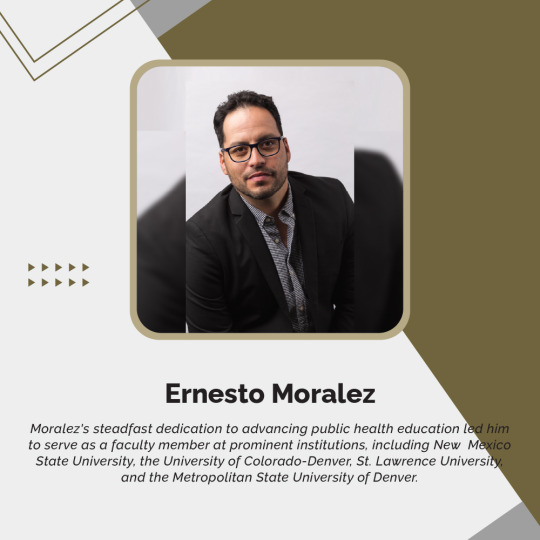#ernesto moralez
Text
Renewing Approaches to Chronic Health Problems: Revealing Insights of Ernesto Moralez
Among the different health conditions that have become noticeable in Western countries today, chronic illnesses such as heart disease, cancer, and diabetes are now the dominant sources of death. Such chronic health conditions are not transmissible, unlike infectious diseases like tuberculosis or pneumonia. In relation to these conditions, there has been a greater focus on prevention aspects such as dietary changes and increased physical activity. However, it is important to recognize that chronic disease has nuanced triggers that often elude casual observation. This discussion will explore the various driving forces of chronic diseases and how a more comprehensive perspective can allow successful prevention.

The 20th century heralded a period where it seemed that the front-facing causes of death in affluent nations had been replaced. Chronic diseases have taken over infectious diseases' place as the most prominent health threat that is the main cause of heavy mortalities. Modern health threats order a refocus on these burgeoning diseases, since heart disease, cancer, and diabetes are now the core issues. Most important of all, these chronic diseases have very complicated and unique etiologies that do not involve infectious agents and conventional transmissibility.
With the increasing trends in cases of chronic diseases, medical and public health fields had to reorient their focus to offer something different. Preventive measures have taken a pivotal role, with a public emphasis on lifestyle modifications such as modifying dietary habits and increasing physical activity. In addition, there has been a growing prominence of pharmaceutical treatments to combat these conditions. While undeniably achieving positive outcomes by extending longevity and increasing the overall quality of life, these measures leave the deeper dynamics of chronic disease unaddressed.
Ernesto Moralez, a scholar in the realm of public health education, suggests that making people morally responsible for choosing a healthy lifestyle is not helpful for preventing chronic disease. According to Moralez, 80% of interventions are conducted quite late in life and thus, do not have any influence on the intensity at which people suffer from chronic diseases.
Instead, Ernesto Moralez proposes solutions designed to address the cause root of chronic diseases through social responsibility. He underlines that it is worthwhile to consider the causes of disease when it comes to disease clusters for chronic illnesses. County maps that show rates of diabetes, for example, would show clusters in the poorer neighborhoods with low health service provisions, high unemployment, and a poor community environment.
Policy-based interventions consist of the implementation of policies such as zoning and restricting the accessibility of tobacco and vaping products to minors. These policies would be implemented in economically disadvantaged neighborhoods, demonstrating how policy-based intervention can impact diffusion for chronic diseases. Through this fresh perspective, measurable differences in the recurrence of these chronic diseases can be observed by public health officials but only after the policy change is enacted.
Ernesto Moralez has been able to translate these ideas into his next edition of a public health textbook, Introduction to Public Health, which he is co-editing with two other authors and is set to be published in 2024.
0 notes
Text
Definições para um continente
A América é um epicédio para uma musa grotesca
A América é um projeto
A América é o elogio simultâneo de milhares de poetas-menores à barbárie
A América é o tumor na garganta do trovador
A América é uma noite longa
A América é uma metáfora para algo que se perdeu
A América é um sintoma
A América é um paradigma para mensurarmos o tamanho da nossa dor
A América é uma festa para a qual ninguém foi convidado
A América é um grito atrás de uma porta trancada
A América é o orgasmo culpado de um estupro
A América é um delírio europeu esquecido
A América é um pesadelo febril
A América é Abdias Nascimento, Roque Dalton, Ronald Reagan, Sandino, Cruz e Souza, Malcolm X, Richard Nixon, Camilo Torres, Costa e Silva, Pablo Escobar, Sérgio Fleury, Nicanor Parra, Fernandinho Beira-mar, Marylin Monroe, John Dillinger, Fidel Castro, Touro Sentado, Garrincha, Luis Carlos Prestes, George Woodcock, Mercedes Sosa, Manuel Puig, Maya Deren, Líber Seregni, Bandido da Luz Vermelha, Guilhermo del Toro, Thoureau, Jesse James, Zé do Caixão, Robert De Niro, Chacrinha, João Goulart, Hugo Chávez, Carlos Castañeda, Marighella, Abimael Guzmán, Jacques Dussalines, Pichon Rivière, Robert Nesta, Jeanine Áñez, Mario Vargas Llosa, Pinochet, James Dean, Chico Mendes, Jair Bolsonaro, Frida Kahlo, Buckminster Fuller, Joseph McCarthy, Violeta Parra, Kenneth Anger, Al Capone, Frantz Fanon, Henry Murray, Brilhante Ustra, Maria da Penha, Ted Bundy, Bonnie Elizabeth Parker, Getúlio Vargas, Elvis Presley, Emile Griffith, Angela Davis, Jorge Rafael Videla, Leonard Cohen, Arminda Aberastury, Eduardo Galeano, Juan Guaidó, Zapata, Roberto Bolaño, Filinto Muller, Tarsila do Amaral, Os dez de Hollywood, Che Guevara, Jorge Ben Jor, Comandante Ramona, Fulgêncio Batista, James Baldwin, Benício del Toro, Subcomandante Marcos, Castelo Branco, Eva Peron, Georgia O’Keffe, Atahualpa Yupanqui, Caio Prado Jr, Evo Moralez, Madame Satã, Silvio Rodriguez, Sidney Portier, Camilo Cienfuegos, Anne Carson, Xuxa, Luís Inácio Lula da Silva, Carlos Gardel, Rosa Parks, Papasquiaro, Victor Jara, Jack Kerouac, Dilma Roussef, Túpac Amaru, Plínio Salgado, Joan Baez, Cabo Anselmo, Roberto Marinho, Chu Ming Silveira, Manuel Marulanda, Jorge Luis Borges, Elizabeth Short, Simon Bolívar, Lezama Lima, Gabriela Mistral, Abraham Lincoln, Pablo Neruda, Mohammed Ali, Carlos Lamarca, Alejandro Jodorowky, Fujimori, Gaspar Dutra, Daniel Ortega, Anne Sexton, Tupac Shakur, Lionel Brizola, El Chapo, Maria Bonita, Roberto Bolaños, Ernesto Geisel, Ed Gein, Ana Cristina César, Mariel Mariscot, Peter Tosh, Somoza, Osman Lins, Sabotage, Maradona, William Alexander Morgan, Robert E. Lee, Ernesto Sábato, Susan Meiselas, Pelé, Raúl Castro, Huey Newton, Paulo Freire, Alfredo Stroessner, Chico Picadinho, Gabriel Garcia Marquez, Clint Eastwood, Cristina Kirchner, Mazzaropi, Paul Schäfer, Allen Ginsberg e Zumbi dos Palmares.
A América é um modo de ser,
de tolerar
traições
até
o fim
sem chorar.
3 notes
·
View notes
Text
Ernesto Moralez's Insightful Approach: Unveiling Hidden Determinants of Chronic Diseases
In the context of our modern societies, chronic ailments such as heart disease, cancer, and diabetes, have become some of the most challenging enemies in our growing world of death. Unlike tuberculosis and pneumonia, which are infectious diseases, chronic illnesses do not transfer from one person to the other through contact. As a result, they require a critical rethinking of the healthcare approaches so that healthcare providers and public health officials can cope with the problems posed by such long-term chronic conditions. These recalibrations have spurred a heightened focus on precautions, adjustments in diets, physical exercises, and the use of pharmacological interventions. As common as these approaches are, they usually fail to capture the intricate influences shaping the chronic disease landscape. This article aims to explore the hidden determinants of these diseases and proposes new solutions for their betterment.

The 20th century introduced a revolutionary change where chronic diseases overrode infectious diseases in terms of being the leading causes of death in the domain of public health. Nowadays, heart ailments, cancer, diabetes, and respiratory illness have taken the limelight. Divergent from infectious ailments, which may be transmitted through interpersonal contact, chronic ailments have complicated and multifaceted causes.
Almost 60% of global mortality has been caused by chronic diseases, which has realigned the foundational principles for public health and medical care. Such a paradigm shift has resulted in the proactive promotion of healthier dietary choices, advocacy for more physical activity, and pharmaceutical remedies for combating chronic conditions effectively. While those strategies have resulted in positive changes in the overall improvement of health, the hidden factors that influence chronic diseases mostly pass unnoticed.
Ernesto Moralez is a major figure and scholar in the area of public health education with insights into chronic diseases. Moralez underscores a deeper concern for addressing systemic factors that go beyond merely promoting personal responsibility in adopting healthier lifestyles. His approach recommends the implementation of zoning policies that restrict the sale of tobacco and vaping supplies, recognizing the critical imperative to reduce access to such products and tobacco and vaping advertisements targeting youths. The challenge thus consists of limiting unhealthy choices in the interest of long-term health.
Ernesto Moralez states that although the promotion of abstinence regarding tobacco products might still be relevant, the healthy lifestyle approach subjects people to unfair moral pressure. Rich areas have sparse numbers of liquor and tobacco stores while socioeconomically deprived regions sustain a larger concentration of liquor and tobacco stores. The concentration of these stores significantly gives the impression that chronic diseases seem contagious. So the restriction of unhealthy options becomes necessary for better health in the long run.
Additionally, Moralez noticed the need to include sources of chronic diseases that cause clustering of diseases in a manner similar to infectious diseases. County maps showing cases of diabetes depict clusters in poor neighborhoods showing low access to medical services, high rates of unemployment, and low-quality neighborhood conditions.
Those eager to engage with the public health approach that Ernesto Moralez is advocating can learn more through his public health curriculum as well as in the upcoming edition of the standard textbook for introductory public health, Introduction to Public Health, which he co-authored.
0 notes
Text
Synergizing Population Health and Education: Illuminating Pathways for Ernesto Moralez's Collective Prosperity
In the intricate tapestry of societal advancement, two fundamental elements—population health and education—are keystones for building resilient and prosperous communities. While traditionally viewed as distinct domains, their intersection presents a compelling opportunity to unlock synergies and drive holistic progress. This article explores the symbiotic relationship between population health and education, shedding light on the transformative potential of their integration for collective prosperity.
The Interwoven Dynamics
Population health and education are deeply interconnected, each profoundly influencing the other. Education serves as a linchpin of health, equipping individuals with knowledge, skills, and resources to make informed decisions about their well-being. Conversely, health significantly impacts educational outcomes, shaping factors such as academic achievement, school attendance, and overall educational attainment.
Life's tapestry is a masterpiece of interwoven dynamics. Each thread, unique in color and texture, contributes to the intricate fabric of existence. Everything is connected, from the delicate balance of ecosystems to the complex interplay of human societies. The butterfly effect reminds us that small actions can yield significant consequences. Understanding these dynamics prompts mindfulness in our choices, fostering empathy and stewardship. It's a reminder that our actions ripple through the fabric of existence, shaping the world around us. Embracing the interwoven dynamics of life invites us to tread gently, recognizing our role as custodians of this beautiful and interconnected planet.
Early Foundations: Nurturing Health and Learning in Early Childhood
The early years of life represent a critical period for shaping long-term health and educational trajectories. High-quality early childhood education programs foster cognitive and socio-emotional development and instill healthy habits and behaviors. By providing a supportive environment that promotes resilience and self-regulation, early childhood education lays a sturdy foundation for lifelong success in both health and education.
Health disparities during early childhood can impede educational progress. Factors such as poverty, inadequate nutrition, and limited access to healthcare can hinder children's physical and cognitive development, undermining their readiness to learn when they enter school. Addressing these disparities in the early years is paramount for promoting equitable opportunities for all children.
Early childhood is the fertile ground where seeds of health and learning are sown. Through play, exploration, and nurturing relationships, children embark on a journey of discovery. Health and education intertwine seamlessly during these formative years, shaping lifelong habits and attitudes. Quality early childhood programs stimulate cognitive development and promote physical well-being. From nutritious meals to outdoor activities, every aspect contributes to holistic growth. By investing in early childhood education, societies lay the foundation for healthier, more prosperous futures. It's not just about preparing for school; it's about nurturing the health and potential of our youngest learners.
Schools as Catalysts for Health Promotion
Schools serve as pivotal settings for promoting health and well-being among children and adolescents. Comprehensive school health programs encompass a spectrum of initiatives, including physical education, nutrition education, mental health support, and access to healthcare services. By embedding health into the educational environment, schools cultivate healthy behaviors and create conducive settings for academic success and overall well-being.
Moreover, schools can extend their impact beyond the classroom walls, reaching families and communities through health promotion efforts. Schools can amplify their influence by engaging parents, caregivers, and community stakeholders and fostering a healthy culture that permeates society.
Empowering Through Education: Fostering Health Literacy and Beyond
Education is pivotal in promoting health literacy, empowering individuals to navigate healthcare systems, understand health information, and make informed decisions about their well-being. By equipping individuals with essential knowledge and skills, education enables them to advocate for their health needs and engage in preventive behaviors.
Furthermore, education addresses the social determinants of health, such as poverty, inequality, and discrimination. By promoting educational equity and expanding opportunities for all individuals, societies can address the root causes of health disparities and cultivate more inclusive and resilient communities.
Forging Collaborative Partnerships for Collective Impact
Collaboration between the education and health sectors is essential for maximizing impact and addressing complex population health challenges. Community partnerships that unite schools, healthcare providers, government agencies, and community organizations can leverage collective expertise and resources to implement evidence-based interventions and initiatives.
By working collaboratively, these stakeholders can address the underlying determinants of health and create environments supporting educational attainment and overall well-being. These partnerships can drive transformative change and pave the way for collective prosperity by forging connections across sectors and mobilizing resources.
Policy Imperatives: Enabling Environments for Success
Policymakers play a pivotal role in fostering population health and education integration. Investments in early childhood education, school health programs, and health literacy initiatives are essential for laying the groundwork for healthier and more prosperous societies. Additionally, policies addressing social determinants of health, such as affordable housing, access to healthcare, and economic opportunity, are critical for creating environments that support educational attainment and overall well-being.
Population health and education convergence offers a fertile ground for innovation and collaboration. By recognizing and harnessing the synergies between these domains, we can unlock new pathways for promoting health, equity, and prosperity. As we navigate the complexities of the modern world, leveraging the power of education and population health is essential for building resilient and thriving communities. Working together can illuminate pathways to collective prosperity and create a brighter future for future generations.
0 notes
Text
Ernesto Moralez | Assistant Professor of Public Health | Albuquerque, NM

To know more, click on the links below :
1 note
·
View note
Text
Ernesto Moralez

Ernesto Moralez is a distinguished public health professor and researcher with a strong commitment to education. His research has transitioned from public health program implementation to creating enriching educational experiences for students. Moralez has received several teaching awards, including the St. Lawrence University Owen D. Young Faculty Award in 2021, reflecting his dedication to student growth and development. His research interests span education, cancer, and health equity, with a focus on understanding health disparities and social determinants.
Website:
Ernesto Moralez
1 note
·
View note